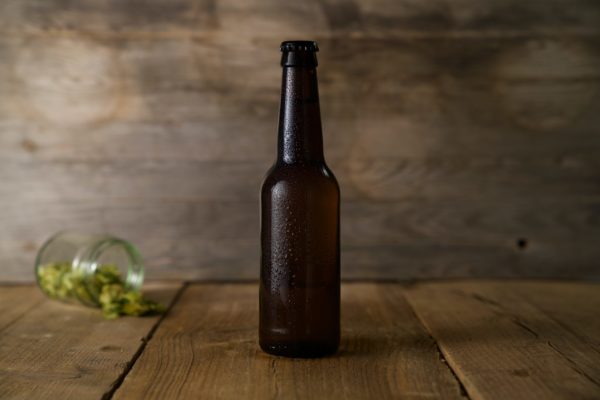If you’re counting your calories to shed a few pounds, you may think you need to give up beer. Beer typically has a reputation for being heavy, full of carbs, and dense. However, there’s a wide variety of light, low-calorie beers out there that can be just as satisfying as your favorite craft brew. You can really enjoy any of your favorite beers in moderation. You just have to be educated about their caloric content, so you can enjoy them within the bounds of your daily calorie goals.
Let’s go over the average calories in a bottle of beer, and we’ll let you in on some of the possible health benefits beer may provide and break down the calorie content of some of the most popular beer brands on the market today.
How many calories are in an average beer?
The calories in a bottle of beer depend on various factors, like the brand, the style, and the alcohol content. In general, your average is 12 oz. serving of beer will have about 150 calories, and your average light beer will have anywhere from 50 to 100 calories.
Beer is made by brewing and fermenting grains with yeast. The yeast eats the sugar and starch from the grain and converts them into alcohol. The calories in beer come from both the alcohol and the carbohydrates from the unfermented grain. This is why pure alcohols, like vodka, are lower in calories because the only calories in pure liquors come from the alcohol itself.
The major indicator of calorie content in an average beer is the alcohol content. This will be indicated by the alcohol by volume label on the bottle or can, sometimes abbreviated as ABV%. The average beer is around 5% ABV. However, beers with more alcohol, like an Imperial IPA, will pack many calories, and light beers, which contain less alcohol, will be lighter in calories.
Is beer good for you?
In recent years, research has indicated that consuming moderate amounts of wine may have health benefits. This has led people to wonder if they may see similar benefits from consuming their daily beer bottles.
While beer is sometimes viewed as empty calories, it does contain some of your daily vitamins and minerals. Regular and light beer contains niacin, riboflavin, choline, folate, magnesium, phosphorus, selenium, vitamin B12, and pantothenic acid. In addition, both types contain smaller amounts of potassium, calcium, thiamine, iron, and zinc. However, you should never use beer as a replacement for whole, solid foods. You’d have to drink far more than the recommended amount of beer each day to get all your daily vitamins and minerals from beer alone.
Some additional health benefits drinking light to moderate amounts of beer may provide. The first potential benefit has to do with the heart. Heart disease is the leading cause of death in the United States, and some studies have shown that moderate beer intake can be associated with a reduced risk of heart disease.
In a 12-week study of 36 overweight adults, researchers found that consuming one to two beers per day improved the antioxidant properties of HDL, or good cholesterol, while also improving the body’s ability to remove bad cholesterol. Another study suggested that low to moderate beer intake could reduce the risk of heart disease to a similar extent as wine.
Some studies have also shown that light to moderate alcohol intake may help improve blood sugar control, which is essential for individuals with diabetes. Several studies have indicated that light alcohol consumption reduces insulin resistance, which is a huge risk factor for diabetes. Another large study indicated that moderate alcohol intake was associated with a reduced risk of diabetes by as much as 43% in men and 58% in women.
It should be noted that these potential benefits are only associated with light to moderate alcohol consumption, aka one to two beers per day. Heavy drinking or binge drinking will always harm the body.
Can I drink beer and still lose weight?
You can consume basically anything in moderation and still lose weight. Each day, your body burns a certain amount of calories, even if you don’t exercise. These calories burnt come from everyday activities like walking, standing, even breathing. If you consume fewer calories from food than the number of calories your body burns, you will lose weight. Consuming more calories than you burn will result in weight gain.
There are a few factors related to beer drinking that can result in weight gain. First off, your body treats ethanol, also known as alcohol, as a toxin, so it will work to get rid of alcohol as soon as possible. This means that your body will prioritize processing the alcohol you drink over the food you’ve eaten. If you’re following a low-carb or ketogenic diet, this means that your body will have to pause converting fatty acids to ketones, which can impact ketosis.
Another less scientific impact that drinking can have on weight loss is poor judgment regarding food choices. We’ve all had a bit too much to drink and indulged in some late-night fast food or greasy pizza. Alcohol can affect your judgment and willpower, leading to consuming foods you may usually avoid when sober.
However, you can avoid these things by drinking in moderation. One or two beers won’t throw off your progress as long as you’ve accounted for them in your daily caloric intake. It’s important to keep an eye on the calories in the specific brand of beer you’re drinking and be cognizant of how many you’re knocking back. If you stay in control and do your research, you can absolutely enjoy your favorite beer and still lose weight.
Calories in popular beer brands
For your convenience, we’ve broken down the calorie counts of some of the most popular beers on the market today.
- Bud Light: The most popular and best-selling beer in the United States, Bud Light is a light lager and thus, has fewer calories and less alcohol than a regular beer. Each 12 oz. bottle of Bud Light contains 110 calories.
- Budweiser: Budweiser is Bud Light’s regular beer counterpart. It is bolder in flavor but contains more calories, carbs, and alcohol than Bud Light. Each 12 oz. serving of Budweiser contains 145 calories.
- Busch: Busch Beer is a crisp, refreshing lager with a recipe that has gone unchanged since 1955. It is grainy, dry, and light, with an ABV of 4.3%, slightly lower than average. Each 12 oz. bottle of Busch contains 114 calories.
- Busch Light: While Busch is considered to be fairly light, if you’re looking for something even lighter, Busch Light may be for you. Interestingly, Busch Light actually has more alcohol than its regular counterpart, coming in at 4.5% ABV. Each 12 oz. bottle of Busch Light contains 95 calories.
- Coors Light: Coors Light is extremely light, smooth, and drinkable. It’s a great choice for those who aren’t usually big beer drinkers, as it’s so light and easy to drink. It’s also a good choice for dieters, as each 12 oz. bottle of Coors Light contains only 102 calories.
- Corona Extra: One of the most popular imported beers, Corona is a bold Mexican lager that is often associated with hot summer days and beach trips. However, Corona is one of the heavier beers on the list in terms of calories, with each 12 oz. bottle containing 148 calories.
- Heineken: A pale lager imported from the Netherlands, Heineken is full-bodied, grainy, and herbal. It has a deep golden color, a light, fruity aroma, and mild bitterness. It’s clean and refreshing, and each 12 oz. bottle contains a slightly heavy 149 calories.
- Michelob Ultra: Michelob Ultra is a light lager with a bright, grainy, malty flavor profile. It’s extremely light and easy-drinking and is a great choice for those on diets. Each 12 oz. bottle of Michelob Ultra contains only 95 calories.
- Miller Lite: Often associated with tailgating and BBQs, Miller Lite a smooth, light, and refreshing American-style pilsner. The brand claims to be the “original light beer.” Each 12 oz. bottle contains 96 calories.
The takeaway
Many people think that going on a diet means giving up all their favorite foods and drinks. This usually includes their favorite alcoholic beverages, like beer. However, this isn’t the case. Beer can be enjoyed in moderation, even when trying to shed a few pounds. As long as you stay knowledgeable about the calories you’re consuming and practice moderation, you can still enjoy your favorite bottle of beer while on a weight loss journey.
To get your favorite brews delivered right to your door, visit Saucey online and start an order today. We offer speedy delivery on a huge variety of wines, beers, and spirits, with zero-order minimums. You’ll get exactly what you want to be delivered in a flash without breaking the bank.




